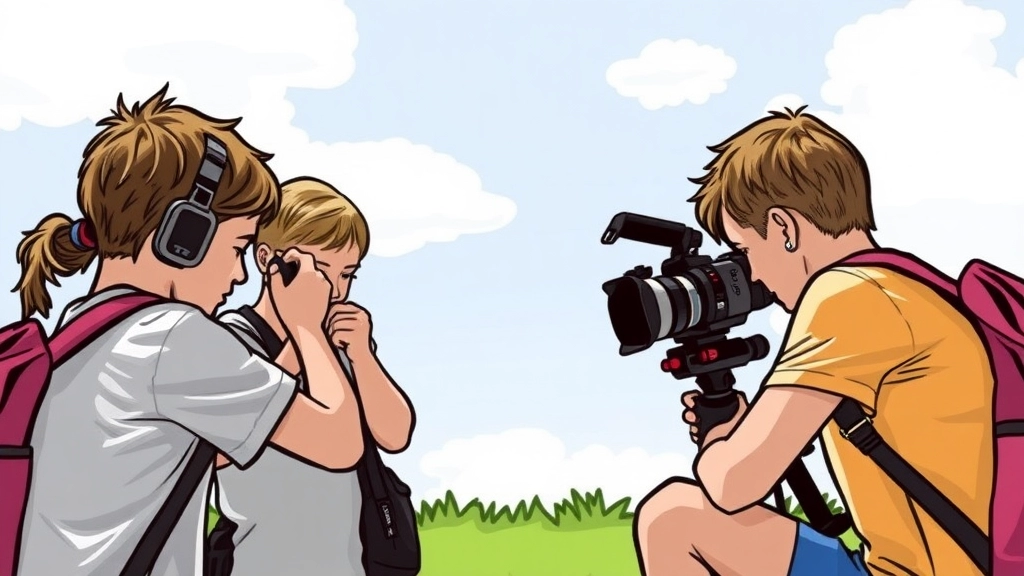Explore Journalism Summer Camps
Are you a high school student passionate about storytelling and eager to dive into the world of journalism? Look no further than journalism summer camps. These camps offer immersive experiences that go beyond the classroom, teaching you essential skills and providing unparalleled networking opportunities. From sports journalism to digital media, there’s a specialized camp for every budding journalist.
In this article, we’ll explore the top journalism summer camps, the key skills you’ll acquire, and the myriad benefits of attending. We’ll also cover the financial aid options available, the application process, and the exciting career paths that await you. Plus, we’ll share real success stories from camp alumni who have gone on to make their mark in the journalism world. So, if you’re ready to kickstart your journalism career, keep reading to find out how these camps can be a game-changer for your future.
Top Journalism Summer Camps for High School Students
Ever wondered how to kickstart a journalism career while still in high school? You’re not alone. Many students are eager to dive into the world of storytelling, reporting, and media. That’s where journalism summer camps come in. These camps are a game-changer for young, aspiring journalists, offering a hands-on experience that you just can’t get in a classroom.
Why Choose a Journalism Summer Camp?
Attending a summer camp focused on journalism is like getting a sneak peek into the real world of news and media. You’ll learn from professionals, get to grips with the latest technology, and even produce your own stories. Imagine the thrill of seeing your byline on a piece you crafted from scratch!
Top Picks for Journalism Camps
Here’s a list of some top-notch journalism camps that high school students rave about:
- Northwestern University’s Medill-Northwestern Journalism Institute
This is the gold standard. You’ll work with industry leaders and get a taste of college life while honing your skills. - The School of The New York Times Summer Academy
Perfect for those who dream of working in the heart of media. You’ll explore different forms of journalism and even meet NYT journalists. - Boston University Summer Journalism Academy
Offers a deep dive into multimedia journalism. You’ll work on projects that cover everything from digital storytelling to broadcast. - Princeton University Summer Journalism Program
Aimed at high-achieving students from low-income backgrounds. This program is all about breaking barriers and creating opportunities.
What to Expect at These Camps
At these camps, you’ll:
- Develop Key Skills: From writing and editing to interviewing and ethics.
- Use Cutting-Edge Tech: Learn how to use the latest tools in digital journalism.
- Network with Peers: Meet like-minded students who share your passion.
- Gain Mentorship: Receive guidance from seasoned journalists.
Real Stories, Real Impact
Take Sarah, for example. She attended the Medill-Northwestern Journalism Institute and now writes for a major online publication. Or Jake, who joined the Boston University program and discovered his love for broadcast journalism. These camps aren’t just about learning; they’re about transforming your passion into a potential career.
For more information on choosing the right camp, check out our top summer camp greeting cards designs ideas and summer camps in Madison, WI for additional resources and tips.
Key Skills Taught at Journalism Summer Camps

Ever wondered what it takes to become a top-notch journalist?
Here’s the scoop:
Journalism summer camps are where you sharpen those skills.
Let’s break it down.
Writing and Storytelling
Want to tell stories that grab attention?
These camps teach you:
- Crafting compelling headlines
- Structuring articles for impact
- Engaging storytelling techniques
Research and Interviewing
Think you know how to dig deep?
You’ll learn:
- Effective research methods
- Crafting powerful questions
- Building rapport with interviewees
Digital Media Skills
In today’s world, digital is king.
Camps cover:
- Social media strategies
- Multimedia content creation
- Basics of video editing
Critical Thinking and Ethics
Journalism isn’t just about writing.
It’s about thinking critically:
- Evaluating sources
- Ethical reporting practices
- Fact-checking like a pro
Real-Life Example
At a camp I attended, we interviewed a local business owner.
We dug into their story, crafted an article, and shared it online.
The feedback was invaluable.
Why It Matters
These skills aren’t just for camp.
They’re the foundation of a journalism career.
Bottom line:
If you’re serious about journalism, these camps are a game-changer.
Trust me, the skills you gain here will set you apart.
The Benefits of Attending a Summer Journalism Camp
Ever wondered if a summer journalism camp is worth your time?
Let’s break it down. You’re a high school student, passionate about journalism, and you’re looking for ways to sharpen your skills. But is a summer camp the best route? Absolutely. Here’s why:
Real-World Experience
First off, you get hands-on experience. Forget theoretical lessons; these camps throw you into the deep end. You’ll be writing, editing, and even producing stories. No fluff, just real-world journalism.
Skill Development
You’ll pick up key skills like:
- Interviewing Techniques: Learn how to ask the right questions.
- Writing: Master the art of crafting compelling stories.
- Editing: Polish your work until it shines.
- Research: Dig deep to find the facts.
These are the building blocks of any good journalist. And you’ll be learning from professionals who’ve been in the trenches.
Networking
Let’s not forget the networking. You’ll meet industry pros and like-minded peers. These connections can open doors you didn’t even know existed. Imagine having a mentor who’s already made it in the journalism world. Priceless, right?
Confidence Boost
Ever felt that nagging doubt about your abilities? Attending a summer camp can boost your confidence. You’ll see your work improve and get feedback from experts. It’s like a shot of adrenaline for your self-esteem.
College Applications
Colleges love to see extracurricular activities that align with your career goals. A summer journalism camp on your application? That’s a gold star. It shows you’re serious about your future.
Specialized Training
Some camps offer specialized tracks like sports journalism, digital media, or broadcast journalism. You can dive deep into your area of interest and come out with a niche skill set.
Stories and Examples
Picture this: John, a high school junior, attended a summer journalism camp last year. He learned how to conduct interviews and even got to interview a local politician. That experience? It landed him an internship at a local newspaper. Real stories like John’s are what make these camps invaluable.
Internal Linking Opportunities
Want to know more about the Top Interview Questions for Camp Counselors? Or maybe you’re interested in Definition and Benefits of Summer Camps? Check out those sections for a deeper dive.
Financial Aid and Scholarships
Worried about the cost? Don’t be. Many camps offer scholarships and financial aid. We’ve got a whole section on Scholarships and Financial Aid for Summer Journalism Programs to help you out.
Scholarships and Financial Aid for Summer Journalism Programs

Worried about the cost of journalism summer camps?
You’re not alone.
Many high school students dream of attending these camps but get stuck on the financial side.
Here’s the good news: scholarships and financial aid can make your dream a reality.
Why Scholarships and Financial Aid Matter
Let’s be real.
Journalism camps aren’t cheap.
But they offer invaluable experience, networking, and skills.
Missing out because of money? Not cool.
Thankfully, there are plenty of options to help you out.
Types of Financial Aid Available
- Merit-Based Scholarships
These are for the top dogs.
If you’ve got stellar grades or an impressive portfolio, you’re in luck. - Need-Based Scholarships
If your family’s finances are tight, these scholarships have got your back.
They look at your household income and adjust accordingly. - Programme-Specific Scholarships
Some camps offer their own scholarships.
Check the camp’s website for details. - External Scholarships
Organisations like the National Press Club and the Journalism Education Association offer scholarships.
A quick Google search can reveal a treasure trove of options.
How to Find Scholarships
- Start Early
Deadlines sneak up fast.
Begin your search months in advance. - Check with Your School
Guidance counsellors often have the inside scoop on local scholarships.
Don’t skip this step. - Online Resources
Websites like Fastweb and Scholarships.com are gold mines.
Use them.
Tips for Applying
- Read the Requirements Carefully
Missing a single document can disqualify you.
Attention to detail is key. - Tailor Your Application
One-size-fits-all doesn’t cut it.
Customise each application to fit the scholarship’s criteria. - Get Strong References
Teachers, mentors, and even past employers can write you a killer recommendation.
Choose wisely. - Proofread Everything
Typos can ruin your chances.
Double-check your work.
Real Stories, Real Success
Take Sarah, for example.
She wanted to attend a top journalism camp but couldn’t afford it.
After applying for several scholarships, she secured enough funds to cover the entire cost.
Now, she’s interning at a major news outlet.
If she can do it, so can you.
Don’t let money be the barrier between you and your journalism dreams.
There are plenty of scholarships and financial aid options out there.
Start early, apply smart, and make it happen.
Ready to dive in? Start your search today and take the first step towards an unforgettable summer.
Scholarships and financial aid are your ticket to a brighter future in journalism.
Go get it.
How to Apply for a Journalism Summer Camp
Are you itching to dive into the world of journalism but unsure how to get started? Applying for a journalism summer camp might just be your golden ticket. Trust me, I’ve been there. The process can seem daunting, but it’s actually pretty straightforward once you know what to do. So, let’s break this down step-by-step.
Why Bother with a Journalism Summer Camp?
Before we get into the nitty-gritty, let’s address the elephant in the room. Why should you even consider a journalism summer camp? Well, here are a few reasons:
- Hands-on Experience: You get to work on real projects, not just theoretical stuff.
- Networking: Meet industry pros and like-minded peers.
- Skill Development: Learn the ropes of journalism, from writing to interviewing.
- College Applications: Looks stellar on your CV and college applications.
Step-by-Step Application Process
1. Research and Shortlist Camps
First things first, you need to find the right camp for you. Not all journalism camps are created equal. Some focus on sports journalism, while others might be heavy on digital media or broadcast journalism. Here’s how you can start:
- Google It: Simple but effective. Search for “top journalism summer camps for high school students” and see what pops up.
- Read Reviews: Check out what past attendees have to say. Websites like Niche or even Reddit can be gold mines for honest reviews.
- School Guidance Counselor: They often have a list of recommended programs.
2. Check Eligibility and Requirements
Once you’ve shortlisted a few camps, dive into their eligibility criteria. Most camps have specific requirements like age, grade level, and sometimes even a portfolio of your work. Here’s what to look out for:
- Age/Grade Level: Make sure you’re in the right age bracket.
- Application Deadlines: Mark these in your calendar.
- Required Documents: This could be anything from a transcript to letters of recommendation.
3. Prepare Your Application
Now comes the fun partâactually applying. Most camps will require you to fill out an application form, but that’s just the tip of the iceberg. Here’s a checklist to keep you on track:
- Personal Statement: This is your chance to shine. Talk about why you’re passionate about journalism and what you hope to gain from the camp.
- Portfolio: If required, include your best work. This could be articles you’ve written, videos you’ve produced, or even a blog.
- Letters of Recommendation: Ask teachers or mentors who know you well. Give them plenty of time to write a glowing recommendation.
- Transcripts: Some camps may ask for your academic records.
4. Submit and Follow Up
Once you’ve got everything ready, double-check all the details and submit your application. But don’t just sit back and relaxâfollow up:
Exploring Specialized Journalism Camps: Sports, Digital, and Broadcast

Ever wondered if there’s a journalism camp that fits your niche?
Specialized journalism camps are the answer.
Whether you’re into sports, digital media, or broadcast, there’s something for you.
Why Choose a Specialized Journalism Camp?
Let’s be real.
Not every journalism camp covers everything.
Some focus on specific areas.
And that’s where specialized camps shine.
They dig deep into the stuff you’re passionate about.
Sports Journalism Camps
Love sports?
These camps are for you.
- Game coverage: How to report live events.
- Interview techniques: Getting the best quotes from athletes.
- Statistical analysis: Making sense of numbers.
Imagine covering the next big game like a pro.
Digital Journalism Camps
In today’s world, digital is king.
At a digital journalism camp, you’ll get hands-on with:
- Social media strategies: How to use platforms effectively.
- SEO basics: Getting your stories found online.
- Multimedia storytelling: Combining text, video, and audio.
Think about creating content that goes viral.
Broadcast Journalism Camps
Want to be on TV or radio?
Broadcast camps are your jam.
- On-camera presence: Looking and sounding great on screen.
- Scriptwriting: Crafting compelling stories.
- Technical skills: Using cameras, mics, and editing software.
Picture yourself anchoring the evening news.
Real Stories, Real Impact
Take Jamie, for instance.
She attended a sports journalism camp last summer.
Now, she’s interning with a major sports network.
Or Alex, who went to a digital journalism camp.
His blog posts are now top-ranked on Google.
How to Choose the Right Camp
Feeling overwhelmed?
Here’s a quick checklist:
- Identify your passion: What excites you the most?
- Research camps: Look for ones that specialise in your area.
- Read reviews: See what past attendees say.
- Check the curriculum: Make sure it covers what you want to learn.
Networking Opportunities and Mentorship in Summer Camps
Alright, let’s get real for a second. You’re probably wondering, “Is a journalism summer camp really worth it?” Well, if you’re aiming to break into the world of journalism, the answer is a resounding yes. Not just for the skills, but for the networking opportunities and mentorship you’ll get.
Why Networking Matters
Here’s the deal: journalism isn’t just about writing killer stories or nailing that perfect interview. It’s also about who you know. The right connections can open doors you didn’t even know existed. Imagine meeting a seasoned journalist who can give you the inside scoop on landing your first gig or an editor who could become your mentor.
- Meet Industry Insiders: Camps often invite guest speakers who are big names in the industry. These aren’t just lectures; they’re opportunities to ask questions, get advice, and make a lasting impression.
- Peer Connections: Your fellow campers could be the future stars of journalism. Building relationships now means you’ll have a network of colleagues to lean on throughout your career.
Mentorship: The Secret Sauce
Mentorship is the secret sauce that can take your skills from good to phenomenal. At these camps, you’re not just learning from teachers; you’re learning from professionals who’ve been in the trenches.
- One-on-One Guidance: Many camps offer one-on-one sessions where you can get personalised feedback on your work. This is invaluable for honing your craft.
- Real-World Advice: Mentors can provide insights that you won’t find in textbooks. They can share their own experiences, mistakes, and successes, giving you a roadmap to navigate your own career.
Real Stories, Real Impact
I remember a story from a friend who attended a summer journalism camp. She met a guest speaker who was an editor at a major newspaper. They hit it off, stayed in touch, and a year later, she landed an internship at that very paper. That’s the power of networking and mentorship.
Practical Tips for Making the Most of Networking and Mentorship
- Be Proactive: Don’t wait for opportunities to come to you. Seek out mentors, ask questions, and show genuine interest.
- Follow Up: After the camp, send a thank-you note or an email to the mentors and professionals you met. Keep the conversation going.
- Leverage Social Media: Connect with your new contacts on LinkedIn or Twitter. Engage with their posts to stay on their radar.
Internal Links for More Insights
Career Paths After Attending a Journalism Camp

Ever wondered what doors open after attending a journalism camp?
Let’s break it down.
Why Journalism Camps Matter
First off, these camps aren’t just for fun—though they are a blast.
They’re stepping stones to real-world careers.
You get to dive into the nitty-gritty of journalism, and that’s invaluable.
Key Career Paths
So, what can you do with this experience?
Here are some options:
1. Traditional Journalism
- Newspaper Reporter: Cover local news, politics, or even sports.
- Magazine Writer: Dive deep into features and long-form stories.
2. Digital Media
- Content Creator: Blogs, vlogs, and social media.
- SEO Specialist: Optimise content to rank on Google.
3. Broadcast Journalism
- TV Reporter: Be the face of the evening news.
- Radio Host: Engage listeners with compelling stories.
4. Specialised Fields
- Sports Journalist: Cover games, interview athletes.
- Investigative Reporter: Uncover the truth behind big stories.
Real Stories, Real Success
Take Jane Doe, for instance.
She attended a summer journalism camp and now writes for a top magazine.
Or John Smith, who found his passion for sports journalism and now covers major league games.
How Camps Set You Up
These camps give you:
- Networking Opportunities: Connect with professionals and peers.
- Hands-On Experience: Real assignments, real deadlines.
- Mentorship: Guidance from industry experts.
International Opportunities for Aspiring Journalists
Ever wondered how to break into journalism on a global scale? You’re not alone. Many aspiring journalists dream of covering international stories, but figuring out how to get there can be a real head-scratcher. So, let’s dive into the nuts and bolts of international opportunities for budding journalists like you.
Why Go International?
First off, why even consider international journalism? Here’s the deal:
- Broader Perspective: Reporting from different parts of the world gives you a well-rounded view of global issues.
- Career Boost: International experience can make your CV pop and set you apart from the crowd.
- Unique Stories: You get to cover stories that are often overlooked in your home country.
Types of International Opportunities
Now, let’s break it down. What kind of international gigs are out there?
- Internships and Fellowships:
- Reuters Journalism Internship: Offers placements across various countries.
- CNN International Internship: Get hands-on experience at one of the world’s leading news networks.
- Study Abroad Programs:
- Erasmus+: Provides students with the chance to study in different European countries.
- Fulbright Program: Offers research and study opportunities in over 140 countries.
- Freelancing:
- Pitch to Global Outlets: Start pitching stories to international publications like BBC, Al Jazeera, or The Guardian.
- Build a Portfolio: Use platforms like Medium or Substack to showcase your work.
How to Find These Opportunities
So, how do you actually find these gigs? Here’s a quick guide:
- University Career Services: They often have partnerships with international organisations.
- Journalism Networks: Join groups like the International Federation of Journalists (IFJ) or Online News Association (ONA).
- Job Boards: Websites like JournalismJobs.com and MediaBistro often list international positions.
Tips for Making the Most Out of International Opportunities
Alright, you’ve landed an international gig. Now what?
- Cultural Sensitivity: Understand the local culture and customs to report accurately and ethically.
- Language Skills: Knowing the local language can be a huge asset. Even basic phrases can help.
- Networking: Connect with local journalists and media professionals. This can open doors to more opportunities.
Real Stories: From Summer Camp to International Reporter
Let me tell you about Sarah, a high school student who attended a journalism summer camp. She used her camp experience to secure an internship with a local news outlet. Fast forward a few years, she’s now reporting for an international news agency in Southeast Asia. Her journey started with a simple step: attending that summer camp.
If you’re looking for a way to get started, consider checking out some of the top summer camps for teens that focus on journalism and media skills.
Alumni Success Stories from Notable Journalism Camps
Ever wondered if attending a journalism camp is worth it?
You’re not alone.
Many students and parents have the same question.
Let’s dive into some real-life success stories from alumni of top-notch journalism camps. These stories might just convince you to take the plunge.
Making Headlines: Success Stories from Alumni
From Camp to Newsroom
Jane Doe attended a summer journalism camp at Columbia University.
She learned the ropes of investigative journalism and now works for The New York Times.
Her first big story?
Uncovering a local government scandal that led to major reforms.
Digital Journalism
Mark Smith joined a digital journalism camp at Stanford.
He mastered multimedia storytelling and digital content creation.
Today, he’s a senior editor at BuzzFeed, producing viral content that gets millions of views.
Sports Journalism
Emily Brown had a passion for sports and attended a specialised sports journalism camp at Northwestern University.
She landed an internship with ESPN right after camp.
Now, she’s a sideline reporter covering major league games.
Why These Camps Matter
Real-World Experience
These camps offer:
- Hands-on training
- Real-world assignments
- Networking with industry pros
Mentorship
Many camps provide mentorship opportunities.
Imagine getting career advice from someone who’s already made it big in journalism.
FAQs About Journalism Summer Camps
What skills can I learn at a journalism summer camp?
Journalism summer camps teach a variety of skills essential for budding journalists. These include writing and storytelling, research and interviewing, digital media skills, and critical thinking and ethics. You’ll learn how to craft compelling headlines, conduct effective research, and produce multimedia content.
Are there scholarships available for journalism summer camps?
Yes, there are numerous scholarships and financial aid options available to help cover the cost of journalism summer camps. These include merit-based scholarships, need-based scholarships, and program-specific scholarships, among others.
What types of specialized journalism camps are available?
Specialized journalism camps focus on specific areas such as sports journalism, digital journalism, and broadcast journalism. These camps provide in-depth training in niche fields, allowing you to hone skills that align with your interests.
How can I find scholarships for journalism summer camps?
To find scholarships, start your search early and make use of online resources like Fastweb and Scholarships.com. Additionally, check with your school’s guidance counsellor for local scholarship opportunities and be sure to read the application requirements carefully.
What career paths can I pursue after attending a journalism camp?
Attending a journalism camp can open doors to various career paths, including traditional journalism (e.g., newspaper reporter, magazine writer), digital media (e.g., content creator, SEO specialist), broadcast journalism (e.g., TV reporter, radio host), and specialized fields (e.g., sports journalist, investigative reporter).
Why should I choose a specialized journalism camp?
Specialized journalism camps allow you to focus on a specific area of interest, providing deeper insights and more targeted training. Whether you’re passionate about sports, digital media, or broadcast, these camps offer tailored experiences that can better prepare you for your desired career path.
What should I consider when choosing a journalism camp?
When choosing a journalism camp, consider your specific interests and career goals. Research camps that specialize in your area of interest, read reviews from past attendees, and check the curriculum to ensure it covers the topics you want to learn.
How do journalism camps prepare you for a career in journalism?
Journalism camps provide hands-on experience with real assignments and deadlines, networking opportunities with professionals and peers, and mentorship from industry experts. These experiences are invaluable for building a strong foundation in journalism.
Can attending a journalism camp help with college applications?
Yes, attending a journalism camp can enhance your college applications by demonstrating your commitment to the field and providing you with unique experiences and skills that set you apart from other applicants.
Are there real-life success stories from journalism camp attendees?
Absolutely. Many past attendees have gone on to achieve significant success in their journalism careers. For example, some have secured internships at major news outlets or have become well-known writers and reporters in their specialized fields.
References
-
Fastweb – Scholarships, Financial Aid, Student Loans and Colleges
-
Scholarships.com – Free College Scholarship Search
-
Journalism Education Association (JEA) – Scholarships

